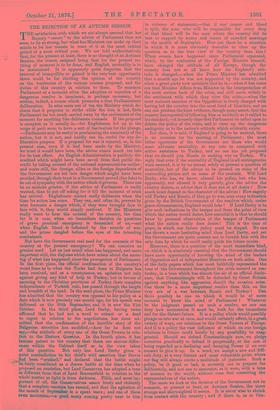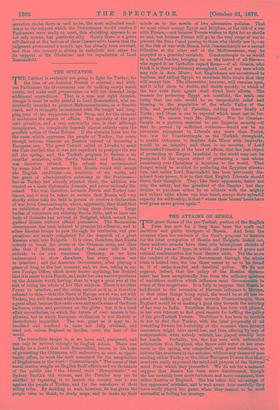THE REJECTION OF AN AUTUMN SESSION.
THE satisfaction with which we are always assured that her Majesty " recurs " to the advice of Parliament does not seem to be so strong, but what her Ministers can make up their minds to let her remain in want of it at the most critical period of a most critical year. We are told authoritatively that, for the present at least, there is no thought of an Autumn Session, the reason assigned being that for the present no- thing of moment is to be done, and English neutrality is to be maintained. It is apparently quite forgotten that the interval of tranquillity so gained is the very best opportunity there could be for eliciting the opinion of the country on the tendencies of the various courses proposed, and the duties of this country in relation to them. To summon Parliament at a moment when the adoption or rejection of a dangerous resolve is imminent, is perhaps necessary, but seldom, indeed, a course which promotes a true Parliamentary deliberation. In nine cases out of ten the Ministry which de- clares that it proposes to strike while the iron is hot, finds Parliament far too much carried away by the excitement of the moment for anything like deliberate counsels. If the proposal is accepted, as it usually is,—for Englishmen led up to the verge of peril seem to have a sort of fascination for the plunge, —Parliament may be useful in proclaiming the unanimity of the nation, but it is not, and hardly can be, useful for any de- liberative purpose. If a proposal for war is rejected, as, in the present case, even if it had been made by the Ministry, we trust it would have been, the advice comes much too late for its best effect. An English Administration is publicly dis- credited which might have been saved from that public dis- credit by taking counsel of the national representatives earlier; and worse still, the foreign allies or the foreign dependents of the Government are led into danger which might have been avoided, through their trust in a Government proved (too late) to be out of sympathy with the nation which it governs. There can be no mistake greater, if the advice of Parliament is really wanted, than to put off asking for it till the moment of crisis has arrived. Englishmen cannot really deliberate when the time for action has come. They can, and often do, prevent by wise forecasts a danger which, if they were brought face to face with it, they would simply confront. If the Ministers really want to hear the counsel of the country, the time for it is now, when no immediate decision on questions of grave practical emergency is demanded of us,—not when English blood is inflamed by the sounds of war, and the prizes dangled before the eyes of the intending combatants.
But have the Government real need for the counsels of the country at the present emergency? We can conceive no greater need. Let us just recall what has happened, and more important still, the disputes which have arisen about the mean- ing of what has happened, since the prorogation of Parliament. In the first place, the official confirmation of the country's worst fears as to what the Turks had done in Bulgaria has been received, and as a consequence an agitation not only against giving any kind of help to Turkey, but in favour of securing to the Christian provinces of Turkey their complete independence of Turkish rule, has passed through the length and breadth of the land. In the next place, the Prime Minister has admitted that the country was opposed to his policy at a date which is now precisely one month ago, for his speech was delivered on the 20th September, and it is now the 21st October. In the third place, Lord Derby, having twice affirmed that he had not a word to retract or a deed to regret in relation to the negotiations, has since ad- mitted that the confirmation of the horrible story of the Bulgarian atrocities has modified,—how far he does not say,—the attitude of every one of the Great Powers in rela- tion to the Eastern Question. In the fourth place, it has become patent to the country that there are serious differ- ences within the Cabinet itself as to the view taken of this question. Not only has Lord Derby given a quiet contradiction to his chief's wild assertion that Servia • had been "crushed," and declared that the battle might
tro
be fairly considered as a drawn battle at the time when he proposed an armistice, but Lord Camarvon has adopted a tone as different from that of Lord Beaconsfield in relation to the whole matter as light is from darkness. Fifth, and most im- portant of all, the Conservatives assert freely and violently that a complete reaction has ensued, and that the agitation of the month of September is a spent wave ; and one of them even maintains,—a good many coming pretty near to him in violence of statement,—that if war comes and blood is spilt, the man who will be responsible for every drop of that blood will be the man whom the country did its best to support by scores and scores of crowded meetings in the month of September. How can there be a situation in which it is more obviously desirable to clear up the question as to the true view of the country than this ? When events have happened since Parliament separated, which, by the confession of the Foreign Minister himself, have changed the attitude of all Europe, though the country does not at all know how far England's atti- tude is changed,—when the Prime Minister has admitted that a month ago he was not supported by the country, and when a great party now maintain that he is,—when it has come out that Minister differs from Minister in the interpretation of the most serious facts of the crisis, and still more widely in the sentiment with which they view the crisis,—when the most eminent member of the Opposition is freely charged with having led the country into the most fatal of blunders, and no one can produce the least evidence, though many assert, that the country has repented of following him as suddenly as it rallied to his standard,—it is surely time that Parliament be called upon to debate the policy of the crisis, and to clear up the dangerous ambiguity as to the nation's attitude which evidently exists.
But then, it is said, if England is going to be neutral, there is no occasion for the meeting of Parliament ; the most bitter opponents of the Government are those who would most advocate neutrality, at any rate as compared with active assistance to Turkey, and no one has yet proposed that we should join Russia in making war on Turkey. We reply that even if the neutrality of England in all contingencies were assured, it is by no means solely at present a question of neutrality, but of the advice to be pressed on some of the contending parties and on some of the neutrals. Will Lord Derby, who has, we know, altered his policy, but who has, apparently, not altered it very gravely, give the advice the country desires, or advice that it does not at all desire ? How much must depend on the character of the advice How eagerly will Turkey and Russia, if they go to war, scan every indication given by the British Government of the resolves which, under grave circumstances, England would take If Lord Derby is to give such indications in the temper and from the point of view which the nation would desire, how essential it is that he should know by personal observation of the temper of Parliament what the nation really does desire I This is the time of grace, in which our future policy must be shaped. No one has shown a more hesitating mind than Lord Derby, and yet the Government are quite content not to furnish him with the only data by which he could really guide his future course. Moreover, there is a question of the most immediate kind, on which it is absolutely essential that the Government should have more opportunity of knowing the mind of the leaders of Opposition and of independent Members on both sides. One of the daily papers which has most faithfully represented the tone of the Government throughout the crisis assured us yes- terday, in a tone which has almost the air of an official disclo- sure, that Constantinople will be defended by Great Britain against anything like aggression, should the occasion arise. Can there be a more important resolve than this, on the very eve of a war between Russia and Turkey ? Can there possibly be one on which it would be of more moment to know the mind of Parliament ? Whatever be the judgment passed on such a resolve, no one can deny how momentous it must be, both for the immediate and for the distant future. It is a policy which would possibly plunge us into war at once, and would certainly affect, in a great variety of ways, our relations to the Great Powers of Europe. And it is a policy the vast influence of which on our foreign relations in future could hardly by any possibility be exag- gerated. Should we defend Constantinople now, we pledge ourselves practically to defend it perpetually, at the cost of being regarded as a declining and decaying Power if we ever consent to give it up. In a word, we accept a new and diffi- cult duty, at a very distant and most vulnerable point, where our flag will always excite a multitude of jealousies. Such a policy, be it good or bad, is certainly one to prepare for deliberately, and not one to announce, as it were, with a tone of menace to the world, without even first consulting the representatives of the nation. The more we look at the decision of the Government not to summon, at present at least, an Autumn Session, the more strange and short-sighted it seems. It is never wise to shrink from contact with the country ; and if there is, as in Con- servative circles there is said to be, the most unlimited confi- dence in the support which the Government would receive if Parliament were really to meet, this shrinking appears to us not only unwise, but positively silly. Surely there is a grave self-distrust at the bottom of these Conservative boasts that the judgment pronounced a month ago has already been reversed, and that the country is sitting in sackcloth and ashes for its support of Mr. Gladstone and its repudiation of Lord Beaconsfield.



































 Previous page
Previous page